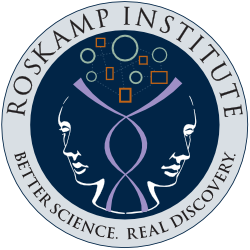Dr. Michael Mullan, Executive Director
There have been many important changes in the field of Alzheimer’s research in the last year, and some of the recent advancements are being directly translated to Alzheimer’s sufferers.
One of the most well-publicized advances has been the approval by the FDA of new treatments for patients in the early stages of the disease. The most important of these FDA-approved drugs is Leqembi, produced and marketed by Biogen and Eisai. This drug, which is actually a monoclonal antibody, is given by infusion on a biweekly basis.
Roskamp researchers played an instrumental role in the development of Leqembi, as over 30 years ago they were part of the team that found the first ever genetic causes of Alzheimer’s disease, which pointed to the removal of amyloid as a potential treatment for the disease. Amyloid is a small protein that builds up in the brain, and is known to be one of the drivers of the disease which ultimately causes loss of neurons (brain cells). Leqembi is remarkably efficient at removing certain types of amyloid from the brain.
A late-stage clinical trial demonstrated that the rates of decline in patients receiving Leqembi were significantly lower than those receiving placebo in an 18-month period. The measures used to assess the rate of decline included those measuring mental faculties such as memory and language function, but also Activities of Daily Living (ADLs) which include self-care, social and personal interactions.
To be clear, the results do not represent a “cure” for Alzheimer’s disease, but they do demonstrate a significant clinical effect which hopefully will also be meaningful to patients and their families. Even though the drug is approved by the FDA there is still clearly much that we have to learn about it and its appropriate use. For instance, from the clinical trial information it is clear that the drug is not suitable for everybody. Individuals most likely to benefit will be those in the mild stage of Alzheimer’s disease, or even the stage before that known as mild cognitive impairment (MCI).
In addition, certain risk factors warrant caution and ongoing monitoring of the use of this drug. Patients have to undergo initial MRI screening to look for brain abnormalities that may preclude the use of the drug, and subsequent MRI screening (at 2, 3 and 6.5 months) following initiation of treatment in order to ensure that a potentially serious side effect does not occur. In particular, Amyloid Related Imaging Abnormalities (ARIA) are a known complication of amyloid-lowering antibody drugs. ARIA-E refers to edema, which is brain swelling, and ARIA-H refers to hemorrhage which is bleeding into the brain. Although these complications are relatively rare, they can lead to severe consequences; therefore their potential occurrence must be carefully monitored.
In addition, the clinical trial results suggest that a common genetic predisposition to Alzheimer’s disease (the APOE4 variant) influences both the likelihood of benefit of the treatments and the likelihood of adverse events. Specifically, the inheritance of two copies of APOE4 is associated with minimal benefit from treatment with Leqembi and increased risk for ARIA side effects.
Clearly much care and consideration needs to be applied to each patient hoping to be treated with Leqembi.
To provide full assessment of the suitability of a patient for Leqembi treatment the Roskamp Institute has established a team with expertise in neurological and cognitive evaluation of dementias, and neuroradiology, specifically with respect to PET and MRI imaging. Only with such a concentration of expertise can the judicial recommendation for treatment with Leqembi be made.
The Roskamp Institute is planning to host an infusion center for patients recommended for treatment with the drug.
Although the approval of this drug is an important step for patients and their families, it is clearly only one part of what will need to be a much broader treatment program in the future to further slow the disease progression and even potentially halt its advancement completely. In order to achieve this, much more research needs to be advanced with respect to the other two main pathologies in Alzheimer’s disease – neuroinflammation, and the so-called neurofibrillary “tangles”. Roskamp Institute researchers are intensively engaged in each of these areas including the development of new drugs aimed at reducing and eliminating tangles and inflammation.
It has taken large collaborative efforts, and many clinical trial failures, to finally develop a drug that successfully does what we predicted more than thirty years ago – namely, to remove amyloid and slow the disease progression.



The brain autopsy done on my mother after she passed showed Alzheimer’s and progressive supra nuclear palsy. Naturally, at 70, I’m concerned about developing Alzheimer’s and would want to be diagnosed as early as possible to take advantage of drugs developed now or in the future that might slow the progression of the disease. Are there genetic tests available now that can identify the likelihood of developing Alzheimer’s? What are the earliest observable symptoms of the disease? What medical specialty is dedicated to diagnosing and treating dementia? Thank you!